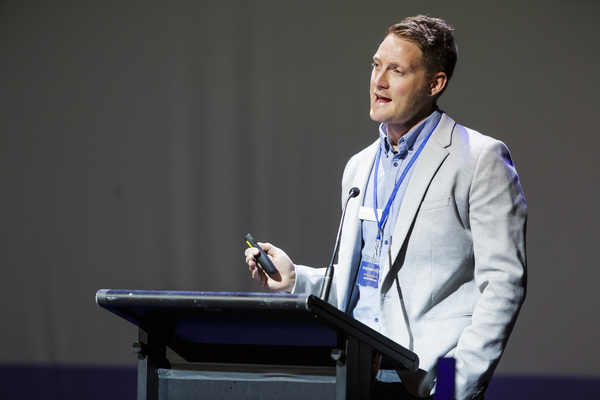
When family violence specialists begin working with a domestic abuser, they are not just working to correct the years of dangerous, learnt behaviour exhibited by the individual – but that normalised in the many generations before them.
Importantly, violence intervention workers trace back to the person – perpetrator or victim’s – experience from the moment they were conceived to the early years of their life when trying to identify the pattern of abuse which has sadly ticked over into their life.
Tom Mulvaney, provisional clinical psychologist and Family Life General Manager Impact and Strategy, is working to drive down the rate of domestic abuse experienced by victims, mainly women and children, in Cardinia Shire’s biggest offensive against the scourge.
Family Life was the a lead agency developing comprehensive responses to support abuse victims and perpetrators in the community when the Together We Can campaign began.
Mr Mulvaney could not stress enough the lifelong impact violence can have on a person when exposed directly or indirectly in-utero through to the first three years of their lives.
The impact, or ‘rupture’, experienced by violence or unreliable role models in a child’s early years exacerbate in lots of different ways – but if ‘unrepaired’, could go on to dangerously frame the course of their lives and likely influence generations to come.
Chemical reactions to stress caused by the threat of violence toward a pregnant woman dangerously impact the health of her unborn child.
Worryingly, police statistics show women who are pregnant or have recently given birth are at higher risk of abuse than those without a child.
Mr Mulvaney said stress, or emotional rupture, could cause changes in neural pathways including dopamine channels, impacting various parts of the body including heart rate and unhealthy coping behaviours including substance dependence or poor eating patterns known to biologically impact the health of a baby.
It goes without saying that physical violence can cause direct physical trauma to the fetus.
Violence suffered by pregnant victims spurs a host of dangerous flow on effects – some directly impacting the mother’s bond with the child once it is born serving to frame his or her perceptions on relationships, Mr Mulvaney said.
“Attachment between mother and child starts in-utero. If a mother is in a state of mind where she can’t nurture that bond, attachment is disadvantaged from birth. That’s one emotional disadvantage that can come from an abuse relationship,” he said.
“And that can occur over generations. If that becomes a person’s expectation of relationships, it makes sense those expectations on what’s considered normal in a relationship is carried forward to the next generation.
“When we look at changing an individual, we are trying to change 100 years of (learnt behaviours). If a perpetrator is 26 years of age, we aren’t looking at 26 years of life and offending … we are looking at years and generations of entrenched learnt behaviour.”
A child who misbehaves in class could easily be dismissed as exhibiting normal ‘boundary pushing’ behaviours tried on by kids in their early years – but they can also indicate something much deeper.
Mr Mulvaney said children directly or indirectly abused within the home could exhibit behavioural or concentration problems that if not ‘repaired’, go on to feed into symptomatic responses in youth through exposure to the juvenile justice system, or worse in adulthood.
In more than 40 per cent of violent abuse experienced in domestic settings in the municipality, children are exposed.
“Disorganised” attachment issues between child and their caregiver do more than harm the child’s understanding of normal relationships, tells Mr Mulvaney.
“It also impact behaviour regulation which is very important in the first three years of life. When a child is distressed, the caregiver soothes them. The child’s body then learns to respond to being soothed and overtime, they can self-regulate that response,” he said.
“When the caregiver is a perpetrator of violence or is affected themselves, they are less able or available to teach kids to self-regulate. Children then learn unhealthy ways to self-regulate.”
Such reactions could be prolonged states of alertness or flatness experienced by the child.
Mr Mulvaney said this was particularly damaging.
The longer a child finds themselves in either state, the easier it is triggered when experiencing non-threatening, normal situations.
“Over time, despite experiencing less (dangerous) stimuli, they will still have that acute response to stress,” he said.
“We often see this in children. It plays out in their behaviour in conduct disorders where they can’t handle the stimuli. They’ll scream, not focus or withdraw completely from the classroom, impacting their access to education.”
The most important intervention to improve a child’s outlook and approach toward their lives is providing predictable and stable caregivers.
Mr Mulvaney said at the first instance, that would involve repairing the child’s relationship with their main caregiver, but if that was unachievable, it would mean creating positive attachments with other adult role models including extended family members or teachers.
The Together We Can campaign to harness victims with the information, support and strength needed to leave a violent relationship as well as bolster prevention, early intervention and reformation services for perpetrators.
Many organisations including Family Life and community leaders are working together to roll-out community-driven initiatives.
Mr Mulvaney said Family Life would work to advocate for additional support services to be introduced into the Cardinia Shire community for victims and perpetrators to seek help.
It will build on services already available by organisations such as WAYSS, Windermere and Connections.
“We need lots of opinions about this to come up with the solution. I am yet to see one single way. It’s a complex problem, so it needs complex solutions, and needs to be driven by the community itself,” Mr Mulvaney said.







